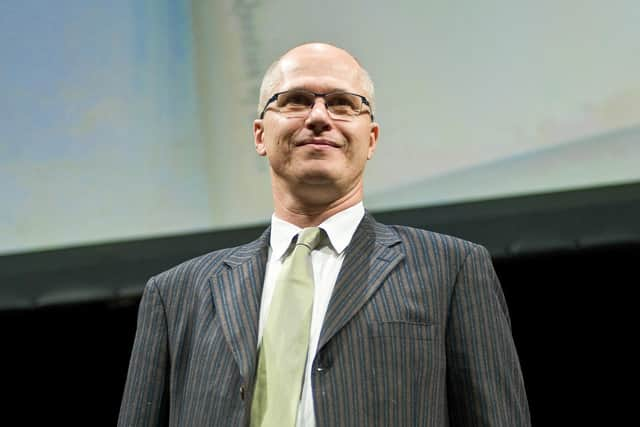Book review: The World And All That It Holds, by Aleksandar Hemon
One of the joys of reviewing, particularly over a while, is discovering authors and watching their careers. I have always had a particular penchant – not exclusive, and not all-encompassing – for the more askance kinds of English-language fiction from beyond these shores. It has been reading, observing and sometimes writing on such writers as Gary Schteyngart, Lydia Millet, Perceval Everett, Shalom Auslander and Emily St John Mandel that has seen me through the wearisome, the second-hand and the outright not-even-wrong.
Among my personal pantheon is Aleksandar Hemon. His new novel might well be the one that moves him from “quirky but interesting” to “mainstream and essential”. I have read almost all of Hemon I think, but it was The Lazarus Project that made me check out his backlist. The Book Of My Lives was one of the most heart-wrenching memoirs I have read; at around the same time we got The Making Of Zombie Wars, which did his trademark funny then poignant palmed card. The World And All That It Holds is something utterly other. It is vast, horrific, tender, exotic, mundane, dreamlike, all-too-real and I will never, ever forget it. In some ways it takes the novel back to its origins. As with Don Quixote, bemused idealists and weary chancers battle their own demons and the structures that would snuff out the world’s joy. Like Don Quixote it is cleverly self-referential and has lessons to impart.
Advertisement
Hide AdThe origins of the plot can be summarised swiftly. Rafael Pinto is a Jewish apothecary, homosexual and morphine addict living in Sarajevo. It is 1914. He will later recount the chain of events leading to a certain bullet being fired towards a certain Archduke, although the veracity of the tale frays in its retelling. He is conscripted, and in Galicia in 1916 has fallen in, and in love with, Osman, a Muslim raconteur, entrepreneur and orphan. There is a delicacy about how those at the end of the Austro-Hungarian Empire viewed homosexuality. It is wise to be discreet, but this is a cosmopolitan, modern place. As Rafo says, with a lead-weight of unconscious irony, this is “a brand-new century, progress was everywhere to behold, the future was endless like the sea – nobody could see the end of it”. They can’t see that soon they will be skittering over a “snake ball of intestines” and a comrade’s “cretin brains”. The journey will spiral out through capture by the Russians, Tashkent, traversing the Taklamakan Desert, the horrors of Shanghai in 1932 under Japanese bombardment (remember, children, World War Two started in 1939) always yearning to be in Sarajevo, and always aware Sarajevo may no longer be there. There are some wonderful characters that flit through. Major Moser-Ethering, a British spy, appears under various guises and there is a horrendous encounter with one character and his Buddhist (!) allies, neatly introduced as “a century or so ago, the taking of Korla by Baron Teutenberg was a fabled massacre, but since then there has been so much killing all over the world it is barely remembered now”.


Three things distinguish this novel and make it exemplary. Firstly, given the multilingual nature of Sarajevo, it is key that the novel is as polyphonic and polyglot. There are scraps of German poetry, Yiddish proverbs, Spanjol – a Bosnian dialect, French, the braid of quotations from Moser-Ethering, Uighar, flickers of Chinese and Russian and more. But at crucial points Hemon will give the quote in the original, translate it within the text, and then it recurs, untranslated. The point, at once both education and moral, is “you have to remember”. Nowhere is this more evident than in the phrase “la gran eskuridad”, which has a shifting, even shifty meaning: the great darkness, the grand oblivion. There is a section on German words for specific wound entries – Kopfschuss being head-wound, Herzschuss, the heart, and as the reader learns we get the awful “Weltschuss”: the world-wound.
Who has harmed the world? Rafo is almost clear, and the second point is how theologically nuanced this bold book is. It even begins: “The Holy One kept creating worlds and destroying them, creating worlds and destroying them, and then, just before giving up, He finally came up with this one. And it could be much worse, this world and all that it holds...” The picaresque narrative is constantly interrupted with moments where God is beseeched, railed at, dismissed, speculated about and occasionally outright condemned. There is no coherence to Rafo’s fretting, but you do not expect sanity in the face of madness.
But thirdly and finally this is a human book. The reader cares about the characters and their fates. But the author is as uncaring as the God that Rafo tries to disbelieve in, since any idea of closure is foreclosed. It is very rare that I read a book and genuinely do not suspect, even if I do not yet know, the angles and trajectories along which the plot is heading. This threw me entirely. If you like things neat, then Hemon’s world is not one for you. I hope, though, hope and pray that people will read this, because I think it is a masterpiece.
The World And All That It Holds, by Aleksandar Hemon, Picador, £18.99